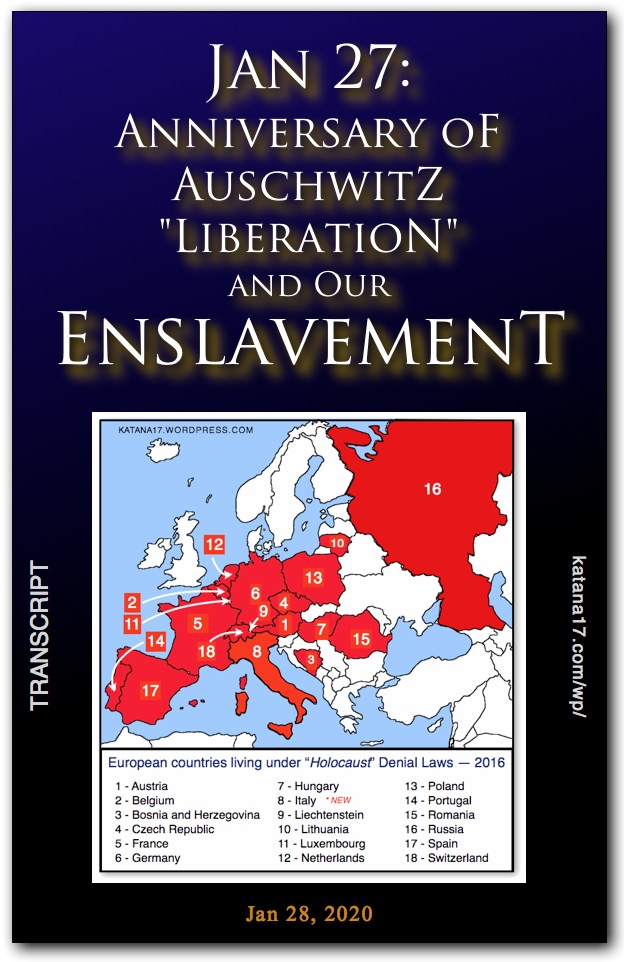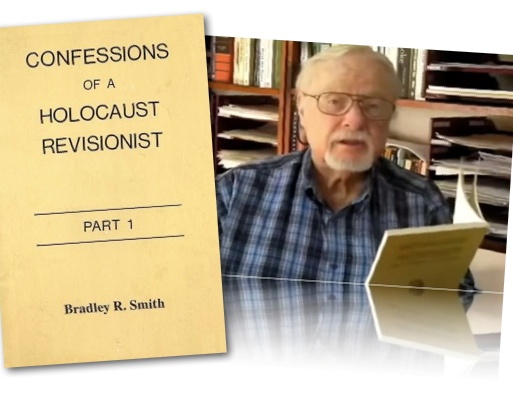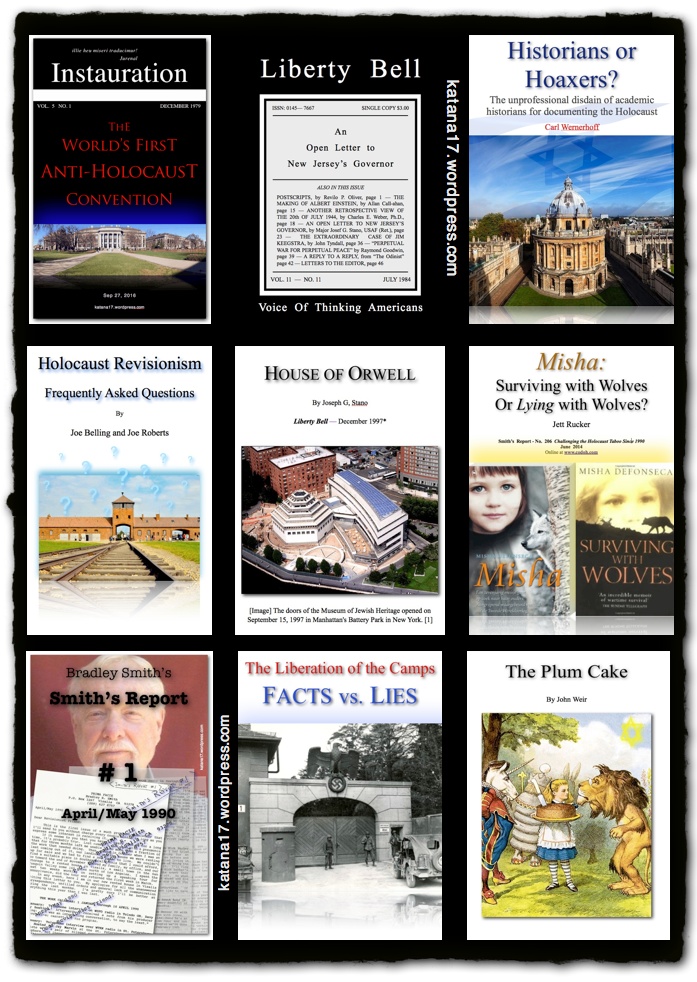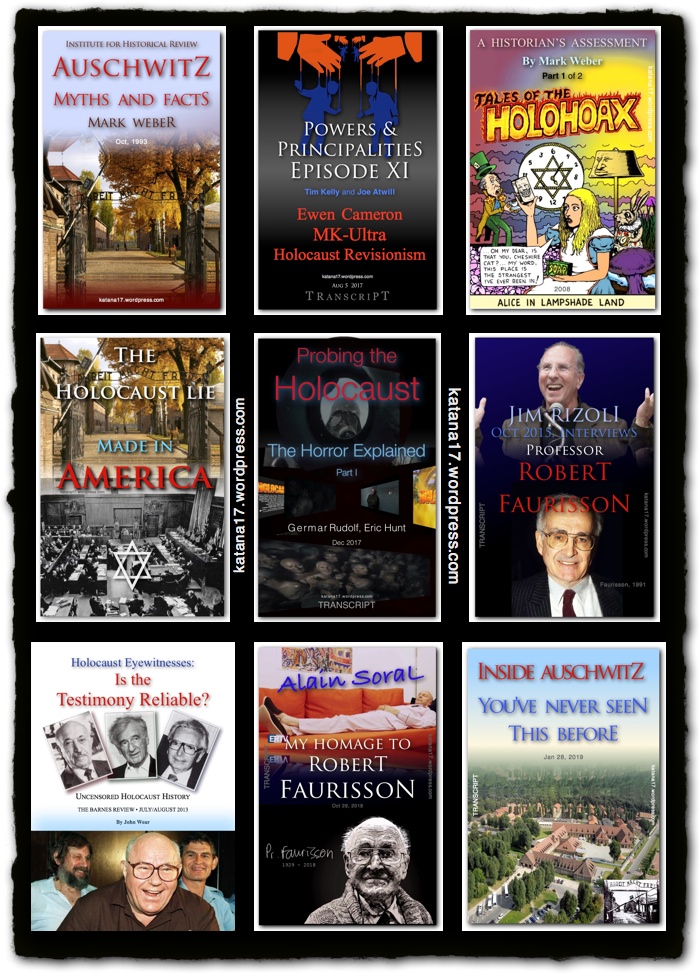Jan 27
Anniversary of Auschwitz “Liberation” and
Our Enslavement
January 27, 2020, is the 75th anniversary of the arrival of Soviet troops at Auschwitz, after the Germans had long fled, having given the inmates of that complex of labor camps the choice of either remaining or fleeing the Soviet terror machine. Most chose to flee west with their “Nazi” captors, including Eli Wiesel and his father, if his tall story-telling is to be believed.
Jan 27, 1945 could also be seen as a date that began our enslavement to “Holocaustianity”, the every increasing worship of the “Holocaust” as the non-historic event, the myth, the “Hoax of the Century”, that is being used as a shield by Organized jewry (orgjew) against any criticism whatsoever of jews and Israel, and as a sword used to cut down any form of rights for White countries to remain White, to resist the invasion of non-Whites into their countries throughout the West, engineered by orgjew.
For the vast overwhelming majority of people the “Holocaust” is essentially real, in that they believe that the Germans had a plan to exterminate jews, and among their methods used gas chambers, to kill about six million of them.
This is what I believed for most of my life. Yet after daring to take the emotionally painful steps to look into the subject, in depth, I now know that it is a diabolical lie.
That emotional process is wonderfully and humorously described by Bradley Smith, the founder of CODOH (Committee for Open Debate On the Holocaust) in his “Confessions of a Holocaust Revisionist” booklet. (see below)
Please also take a look at the many articles, linked below, from a revisionist perspective. You will be challenged, and if you are the type of person who is interested in knowing what really happened you will be compelled to dig deeper. Otherwise remain a “Holohoax denier”.
— KATANA
“Confessions of a Holocaust Revisionist”
This episode is wonderfully, beautifully and even amusingly retold in Bradley Smith’s “Confessions of a Holocaust Revisionist“, Chapter 1.
I PAUSED TO ACCEPT a photocopy of a newspaper article he was handing out when he quickly started telling me that the stories that six million Jews had been exterminated during World War II are not true.
I felt stunned, as if Buck Rogers had somehow come down from the 21st century and zapped me with a beam from his ray gun. I had heard about people like the little man who was confronting me, who deny that the Holocaust happened, but I had never actually seen one.
He was a small, thin, middle-aged man with a white pointy beard, clear blue eyes and a ruddy complexion.
The picture of health. He talked fast (though in a well-mannered, articulate way) as if he were afraid he would lose me.
In the first instant I didn’t truly grasp what he was saying; then I understood that he was telling me that there had been no Nazi gas chambers — none – that the stories I had heard all my life about the gas chambers were meant to gain sympathy for Jews at the expense of Germans. I felt my heart change its beat and pick up speed.
I felt sweat appear on the palms of my hands.
The first thing I wanted to do was to get away. We were on the mezzanine of the Bonaventure Hotel in downtown Los Angeles; there were a lot of people standing around and I supposed that he had proselytized the others before I had arrived. The others then had already heard what I was hearing now, and in my imagination each of them had one eye on me, waiting to see what my first move would be, waiting to judge me.
I felt ashamed listening to the man talk about Jews. I felt ashamed holding the photocopied articles in my hand. I could not have repeated anything he had said after his first few words; my brain had closed itself down in self-defense and yet: I was aware that he sounded knowledgeable and sincere.
I felt trapped between his sincerity and my shame. I wanted to get away from him, to hand back his flyers and turn away so that those who were watching would see that I rejected out of hand everything he was saying. At the same time, because of his honest and open manner, I didn’t want to cause him embarrassment by publicly rejecting him. I had never looked into the history of the Holocaust, had never examined any of the primary documents used to support the literature, so in my ignorance I felt I had no right, really, to believe or disbelieve any statement about it whatever. I didn’t feel I had the right to embarrass another man simply because he doubted what I believed. If sincerity isn’t to be taken seriously in human relationship, what is?
In the end the little man with the white devil’s beard and the very blue eyes made my decision for me when he turned to a new arrival and began his spiel all over again from the beginning.
Feeling defiled somehow by the flyers in my hand, I walked toward a large trash can. Even at that moment I knew that the problem wasn’t so much that I was holding the flyers as that I was being observed by others to be holding them. I had accepted the flyers innocently in deference to another’s sincerity. The shame I felt, the defilement, did not come from inside me but from the others, from what I understood to be the standards of my peers.
As I approached the trash can I glanced down at the lead article in one flyer. It was titled, “The Problem of the Gas Chambers, or The Rumor of Auschwitz.”
What Rumor?, I thought. What problem? There wasn’t anything that rang a bell for me. The author of the article was a certain Professor Robert Faurisson. I’d never heard of him. Then I noticed that the article had originally been published in Le Monde, the Paris daily. It was confusing. I had no idea at all what the problem of the gas chambers might be, or what the rumor of Auschwitz referred to. It sounded crazy. And I’d never heard of Faurisson. But I did know about Le Monde. My understanding was that Le Monde was one of a handful of world-class newspapers.
What, then, was Le Monde doing publishing an article critical of the Holocaust, or the gas chambers, or whatever? A moment before I had intended to drop the flyers into the trash on principle. In my circle you did not read material that might make Jews feel uncomfortable. It was a principle. It was necessary in my circle to maintain principles about some few things. Not many, but some. At the last moment I folded the flyers and put them in my back pocket. All that day I went about my business, the flyers folded up secretly in my pocket.
That night, alone in my room, like a thief, I took them out and read them, all the while conscious of the fearfulness in my behavior, the lack of self-respect. I was aware that I was reading something that everyone I knew, and all the people I liked best, would think bigoted and dirty, and that I was doing it at a time and in a place where they could not find me out. I had spent years learning to accept the weaknesses in my character, and to stand aside from them, yet there I was, 49 years old, hiding in my room with a newspaper article, fearful and ashamed.
In Chapter 3, Bradley continues, …
HOW CAN I EXPLAIN what happened to me in my apartment that night? I read a newspaper article written by a professor I had never heard of which had been translated from French by who knows who, given to me on a hotel mezzanine by a stranger who was probably a crank, maintaining a thesis that was outrageous and dangerous because – of what? I didn’t know, but a sense of tension and danger enveloped the thing. I sensed immediately into the reading that if I didn’t reject everything Faurisson was saying that I would be in danger of suffering great losses, though that night I would not have been able to identify what they would be.
Why was I willing to read the Faurisson piece with an open mind? I’ll never know, but the source of its original publication was given, along with the date, so the accuracy of the translation could be checked.
Key statements in the text were referenced; anyone willing to spend an hour or so in a good library could discover for himself if Faurisson was being honest in those instances. I was impressed by the simplicity of his claims and the objectivity of his tone, treating as he did a matter of tremendous significance from such a radical perspective.
Another probably reason was ignorance. Until that time I had not read a history of the Holocaust and hadn’t paid much attention to the stories of Holocaust “survivors.” I don’t know why. There were no heroes in the Holocaust stories I had heard – maybe that was it. Masses of sheep-like people being herded to the slaughter. Helplessness, passivity, pathos, no heroes to create tragedy from catastrophe. Maybe that was it. Ignorance then, a disinterest in suffering unredeemed by heroic action and finally, I suppose, a kind of primary boredom with a wretched story told and retold far too often.
That being so, how is it that I was so stunned at reading Faurisson’s thesis about the poison gas chamber stories? If the stories had not interested me in the first place, why should I have been affected by the discovery that they might not be true? Wouldn’t my fundamental lack of interest in the Holocaust forfeit my right—to a certain extent—to be shocked by the possibility that Faurisson had his finger on something?
But the real surprise might have been my discovery that despite my ignorance and the boredom I professed about the Holocaust, I had believed everything I had ever heard about it. Not the shadow of a doubt had ever crossed my mind. I had believed all the eyewitness testimony related by Holocaust survivors. I had believed what I understood to be the thesis in all the books written by Holocaust historians. Maybe that is why something broke in me that night. Maybe I had believed too rigidly for too long. There was nothing in me that could give a little. No room to bend. Intellectually, psychologically, something had to break. I think it was belief itself that finally cracked that night. My mind welcomed it— but in my heart I felt the awful anxiety that only great insecurity can create.
===============================================
See Also:
The World’s First Anti-Holocaust Convention — Instauration Dec, 1979
An Open Letter to New Jersey’s Governor
Misha: Surviving with Wolves or …
Bradley Smith’s Smith Report # 1
The Liberation of the Camps: Facts vs. Lies
Powers and Principalities XI – Ewen Cameron, MK-Ultra, Holocaust Revisionism — TRANSCRIPT
Tales of the Holohoax – A Historian’s Assessment – Part 1
The Holocaust Lie — Made in America
Probing the Holocaust: The Horror Explained — TRANSCRIPT
Jim Rizoli Interviews Prof Robert Faurisson, Oct 2015 — TRANSCRIPT
Holocaust Eyewitnesses: Is the Testimony Reliable?
Alain Soral – My Homage to Robert Faurisson, Oct 2018 — TRANSCRIPT
Inside Auschwitz – You’ve never seen THIS before! — TRANSCRIPT
Amazion Bans 100s of Holocaust Revisionist Books!
AUSCHWITZ – A Personal Account by Thies Christophersen
Jim Rizoli Interviews Bradley Smith — TRANSCRIPT
London Forum – Alfred Schaefer – Psychological Warfare – TRANSCRIPT
The Realist Report Interviews Eric Hunt — TRANSCRIPT
Red Ice Radio: Nicholas Kollerstrom — TRANSCRIPT
The Realist Report with Carolyn Yeager on Johnson vs Anglin debate — TRANSCRIPT
============================================
Version History
Version 2: Sep 13, 2023 – Updated image links.
Version 1: Jan 28, 2020 – Published post.






Carlo MATTOGNO “Hitler et l’ennemi racial”, éditions “La Sfinge”, Rome, 2010, pp.144
L’éditeur allemand révisionniste Germar Rudolf, devenu très célèbre avec “Le Rapport Rudolf”, a publié les traductions anglaises des écrits révisionnistes de l’italien Carlo Mattogno par sa maison “C.o.d.o.h” (Committee of Open Debate On Holocaust) basée aux Etats Unis. Voilà ses mots tenus lors d’un entretien radio récent avec John Friend :
“J’édite et publie principalement d’autres auteurs, en particulier le chercheur italien Carlo Mattogno que je considère comme le plus grand expert du monde en matière d ’« Holocauste »en général. Il a publié des monographies sur à peu près tout ce que vous pouvez imaginer, à quelques exceptions près. Mais il a couvert tout le territoire et il a un savoir qui n’est égalé par personne! Pas même les historiens traditionnels! Ils ne peuvent pas le toucher avec quoi que ce soit avec la profondeur et l’intensité de la connaissance qu’il possède. Il ferait sortir tout historien orthodoxe de l’eau avec facilité! Et j’ai le plaisir et l’honneur de publier son matériel. Et actuellement, je travaille à faire traduire un autre de ses livres de l’italien à l’anglais. Je suis principalement devenu traducteur et éditeur “. Le Grand éditeur alors Germar Rudolf avait sélectionné parmi ses auteurs l’italien Carlo Mattogno qui a voulu examiner les rumeurs “des usines à savon humain fabriqué avec la graisse des corps de juifs” (op.cit.page 34). Mais contrairement à son compatriote Thies Christophersen, que nous avions lu et présenté aussi dans le passé, lui il avance la thèse qu’aucun juif n’a été assassiné dans les camps de concentration, même pas à celui de Birkenau, le seul camp d’extermination selon Christophersen. Au contraire il avance la thèse que Auschwitz possédait aussi une piscine pour ses détenus. Birkenau devint un camp transit “pour la répartition de la main d’œuvre juive dans d’autres camps de concentration”(op.cit.page 130). C’était grâce à Mattogno que nous avons résolu une autre suspicion très ancienne à nous : la chanteuse grecque à succès Mariza Koch (Μαρίζα Κωχ en grec) parait qu’elle avait rencontré ce succès incroyable local à cause de sa religion. Nous l’avons mise en parallèle avec Ilse Koch la juive citée aussi par un autre grand chercheur révisionniste (mais américain cette fois) Arthur Butz dans sa “Mystification du Siècle”.
écrit par Dionysos ANDRONIS
Here’s Google Translate of your comment:
Carlo MATTOGNO “Hitler and the racial enemy”, editions “La Sfinge”, Rome, 2010, pp.144
The German revisionist editor Germar Rudolf, who became very famous with “The Rudolf Report”, has published the English translations of the revisionist writings of the Italian Carlo Mattogno through his house “Codoh” (Committee of Open Debate On Holocaust) based in the United States . These are his words in a recent radio interview with John Friend:
“I mainly edit and publish other authors, in particular the Italian researcher Carlo Mattogno who I consider to be the world’s foremost expert on the ‘Holocaust’ in general. He’s published monographs on just about anything you can think of, with a few exceptions. But he has covered the whole land and he has a knowledge that is unmatched by anyone! Not even traditional historians! They cannot touch him with anything with the depth and intensity of knowledge that he has. He would get any Orthodox historian out of the water with ease! And I have the pleasure and the honor to publish his material. And now I’m working on having another of his books translated from Italian to English. I mainly became a translator and editor ”.
The then Great Publisher Germar Rudolf had selected among its authors the Italian Carlo Mattogno who wanted to examine the rumors of “human soap factories made with the fat of the bodies of Jews” (op.cit. page 34).
But unlike his compatriot Thies Christophersen, whom we had also read and presented in the past, he puts forward the thesis that no Jew was murdered in the concentration camps, not even that of Birkenau, the only camp of extermination according to Christophersen. On the contrary, he advances the thesis that Auschwitz also had a swimming pool for its inmates. Birkenau became a transit camp “for the distribution of Jewish labor to other concentration camps” (op.cit. page 130). It was thanks to Mattogno that we solved another very old suspicion of ours: the successful Greek singer Mariza Koch (Μαρίζα Κωχ in Greek) seems to have met this incredible local success because of her religion. We put it in parallel with Ilse Koch the Jewess also quoted by another great revisionist researcher (but American this time) Arthur Butz in his “Mystification of the Century”.
written by Dionysos ANDRONIS